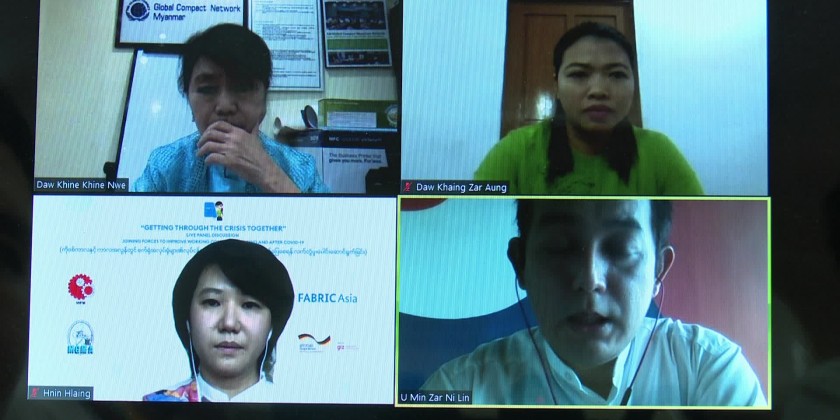


The textile and garment industry has 80% of foreign investment in Myanmar and only 30 % of them are in operation at present.
The Secretary General of Myanmar Garment Manufacturers association pointed out during a virtual panel discussion on "Joining Forces to improve working conditions during and after COVID-19", held on Wednesday.
The panel discussion was organized under the GIZ Fabric project which aims to promote sustainability in the textile and garment industry in Asia.
The discussion focus on mutual understanding among the employer and employee, worksite safety and health management during and after COVID-19 crisis.
She added that cooperative efforts are being made among employers and employee for solving the issue during this period.
Secretary General, Myanmar Garment Manufacturers Association, Khine Khine Nwe said “All the industries are facing the impact of COVID-19 around the world. The garment manufacturing sector is a services process so it is now facing shortage of raw materials supplies, order declining, canceling, and stopping. So, the impact has been faced not only to the employee but also to the employers. Most of the order will be completed by the end of July in some garment factories and some will stop in August. We are not sure what will become in next period.”
She added that Myanmar has weakness in practicing social dialogue and it needs to build mutual trust and more cooperation among the employers and employees.
The President of Industrial Workers Federation of Myanmar said they are conducting social dialogue, bringing diverse interests and finding join solutions, creating smooth work flow among the employers and employee.
President, Industrial Workers Federation of Myanmar (IWFM), Khaing Zar Aung said “We cooperated with ILO for the COVID-19 impact educative awareness program, hand gel and face masks distribution, disinfect spraying, posters and pamphlet distribution, infectious disease prevention program. The employees now understand and notice the impact of COVID crisis. But there are still many problems such as wages, getting fired or laid off and overtime. We carried out the negotiation among them and learnt how to overcome the challenges in foreign countries.”
During the COVID-19 pandemic, more than 60,000 employees are losing their job due to the shutdown of textile and garment factories in Myanmar.
MITV is a broadcast TV brand intended for international and local English speaking consumers, launched on 31st March 2010 based in Yangon.